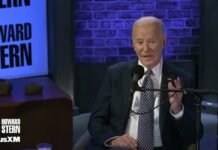Kevin Seefried received a three-year prison sentence for obstructing an official proceeding.
A Jan. 6 defendant seeking to be released from prison was granted in part by the United States District Court for the District of Columbia this week.
The order, signed by U.S. District Judge Trevor McFadden on March 26, will grant (pdf) the release of Kevin Seefried, a defendant convicted for his role in the Jan. 6, 2021, Capitol breach, pending the appeal of his conviction.
This decision comes despite stark warnings from the Justice Department regarding the implications of such a move.
Mr. Seefried received a three-year prison sentence for obstructing an official proceeding among other charges, facing a potential maximum sentence of 23 years.
After his conviction, he appealed and requested release pending appeal, a request that gained new relevance when the Supreme Court decided to review a related case, Fischer v. United States, which could impact many Jan. 6 defendants.
The high Court’s decision on this case may influence the outcome of Mr. Seefried’s conviction, suggesting it could be vacated depending on the justices’ ruling.
Judge Notes Deja Vu
The decision to release Mr. Seefried is grounded in the ongoing legal debate over the application of 18 U.S.C. § 1512(c), the obstruction of an official proceeding statute, beyond the context of “evidence impairment.”
“Seefried’s current motion is déjà vu all over again,” Judge McFadden wrote.
This legal question is currently under review by the Supreme Court in a related case, Fischer v. United States, which directly challenges the scope of § 1512(c) and its application to the Jan. 6 defendants.
Judge McFadden, in his memorandum order, outlined that the release is premised on two conditions mandated by 18 U.S.C. § 3143(b): a defendant is not likely to flee or pose a danger to the community if released, and that the appeal raises a substantial question likely to result in a significantly lesser sentence or reversal.
Judge McFadden found that Mr. Seefried met both conditions, noting a lack of evidence to suggest Mr. Seefried would flee or pose a danger, and that the Supreme Court’s review of Fischer represents a substantial question of law that could materially affect Mr. Seefried’s conviction.
Judge McFadden noted the argument of the Justice Department that, in their belief, he now knew the “day-to-day reality of confinement in prison” and was therefore “more likely” to flee than return to prison.
By Chase Smith














































